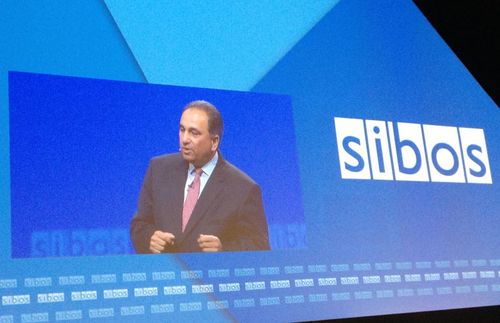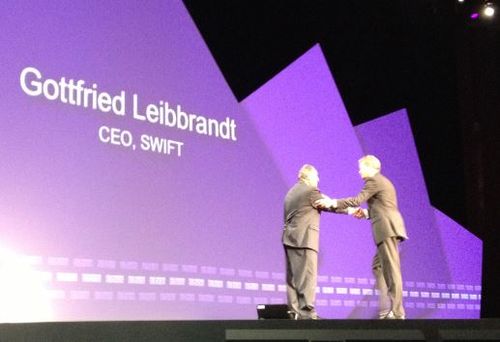
It’s been an interesting day so far as, like many, I missed lunch and wandered around holding my smartphone and laptops up in the air trying to find some form of WiFi access.
Nada.
Nowt.
So there you go folks, we are at the world’s leading banking conference and zero access to the world.
No worries, we’ll just use notepads and pens and send letters. Alternatively, and this is my
secret, you walk 10 kilometres to a secret place to blog.
That works for me and yes I need the exercise. The only thing is I can’t read my writing.
Anyways, in between walking to my secret hidey hole, I managed to walk the exhibit floor and what a floor it is.
Two big aircraft hangers full of stuff from ATMs that issue cash and gold coins to a lion that tries to eat your wallet (yes, ING, I’ve got your number!).
After an hour or so of playing hide and seek with the WiFi, I then realised it was time to jump onto SIBOS TV.
Difficult to do, as I’ve a face for radio as my friends tell me all the time.
But we had a nice chat about the future of money, building upon our opening dialogue this morning in the innotribe session, and before you know it, it’s time to jump into the plenary session.
The session kicks off with Samir Assaf, Global Head of Banking and Markets for HSBC talking about how this is the first SIBOS to take place in the Middle East, and that it will be one of many to come he expects as the Middle East is becoming ‘the crossroads of the world’.
Here’s my loose interpretation of what Samir said.

Economies are recovering with America back in growth and the EU out of recession (after six consecutive quarters of contraction).
Although there has been some loss of growth in emerging markets, this should come back as this is a reflection of the rebalancing of the global economy. In addition, although China is seeing some retraction, there is a great deal of Indo-China trade within the Southern Hemisphere. This means that the economies in the growth markets are sustainable and will be even greater, as the Western markets come back.
Banks remain vital in these shifts of economic value, as their support of trade and advice to clients regarding their working capital positions is an integral part of global trade.
But banks have been integral to creating this crisis of global economies, and are therefore still dealing with the fallout five years since Lehmans collapsed.
This leads to many debating points, such as leverage ratios. Leverage of trade finance is different
to leverage of derivatives and OTC markets, and Basel III needs to take this into account.
A second debating point is counterparty risk. The directive for Alternative Investment Management for example, is pushing asset managers to concentrate risk with single custodians, increasing counterparty risk.
The same with OTC derivatives needing to be collateralised and reported through new central counterparties. That concentrates risk, rather than diversifies it.
Alternative payments is a third area of interest, with these alternative payment services representing 1 in 4 of all movements of money by 2020. That’s an area for innovation and many new disruptors are targeting this space (just come to innotribe to find out how).
Non-banks are less regulated than banks and some are hardly regulated at all, so a lot of business flow is moving into unregulated areas as a matter of efficiency for our clients, but not for stability for them.
This means we will see other changes, and have already, such as more than one dominant currency.
The Renminbi is rapidly rising to challenge the US Dollar, as illustrated by SWIFT movements of Renminbi increasing 170% between 2012 and 2013 to become one of the top ten traded currencies of the world, and it will only increase in usage.
HSBC have corporate clients authorising over a billion dollar payments on their mobile devices now.
It’s not all about new technology for treasury however, but also about problem solving how to integrate existing technologies into new solutions. It’s the same in banking, and we must move from product centric innovation to client centric innovation. We need to solve the problems our customers face.
We need to change but, more than this, we need to fundamentally think differently.
In our industry, we all do many of the same things, replicating cost and overhead for no gain. We should look to work together to create mutual services and reduce costs, and SWIFT can help this.
KYC is the most obvious candidate. We all do KYC and all source the same data with no value add or proprietary value for doing this. So we should create a KYC utility shared for all.
Another candidate is the sourcing, clearing and processing of pricing information. We all do this
the same way, with the same data into our own proprietary systems, and with regulators asking for more reference data points, we are creating even more data.
Is there a better way?
A better auditable reference data service provider that would be cheaper and more effective than everyone doing this?
Of course there is.
We need to act more like Wikipedia, allowing open platforms to ensure that everyone can contribute, collaborate and increase the quality of our data rather than dividing and separating all of this between our disparate forces.
We are living through a time of major change and must prove that banks are worthy of this change.
We can and should compete, but we should also work together to make sure we achieve what is worthwhile in the most cost effective manner.
That is our collective responsibility.
Yawah Shah, the Chairman of SWIFT, then came on stage to deliver the SWIFT message …. or messaging that is.

Yawah began by promising more price reductions for FIN message pricing. This is to be reduced 20% per annum starting from January 1 2014, building upon the average message cost already being a quarter of what it was ten years ago.
SWIFT will also help clients with compliance, talking with the Chief Compliance Officers, Heads of Anti Money laundering and fraud, to provide a sanctions compliance service.
Our aim is to provide a shared service for sanctions monitoring for our clients and, for the larger banks, sanctions testing to ensure their systems are resilient to these issues.
We are also going local and are partnering with local banks to launch services. The first of these
is a joint venture with the Indian banks to offer services.
It is a fundamentally different way at looking at new markets for SWIFT, and is a joint venture with the Indian banks to achieve this. We have not been successful at being joint so much in the past, so we will work hard to make this a successful joint venture.
Finally, we have a big worry about cybersecurity, and the threat of attack to the SWIFT network, as well as the challenge of SWIFT being used as a geo-political football, in terms of our data and access.
Our true mission is to be globally neutral, so we should not be used as a political football. In
fact, at forty years old, it begs the question: is SWIFT heading for a midlife crisis?
SWIFT is not representative of any one country, but a global force.
That means avoiding interference from anyone or anything that is not representative of a global force.
Interesting, especially this last point as methinks about Iranian banks being thrown off the SWIFT network due to American influence.
The plenary finished with Gottfried Liebbrundt (him again!) talking about the world going through massive revolutions of change, and moving faster and faster from West to East.

There are three billion new consumers who will be middle class in the BRICs for example, with these nations moving through an industrial and manufacturing revolution in just ten years, that took the West 200 hundred years to go through
Add onto this the technology revolution we all are experiencing today, and you see the change in this world.
Then you add to these changes of industrialisation and digitation, regulation.
We, in this industry, are suffering another volcanic eruption of regulation due to the issues raised five years ago.
This regulation is everything from structural systemic to the whole way we are policed and governed.
So we see industrialisation, digitisation and regulation as the three forces fundamentally changing our world and it is well illustrated by the innotribe discussions of Bitcoin.
Bitcoin is a disruptor that is taking advantage of our weaknesses as trusted value exchanges, the strength of the digitisation of the world and the industrialisation of being able to exchange globally through these technologies.
What does this mean for SWIFT?
It means we have to follow our customers and our customers’ needs.
That means going global, having investments in the East, with a new data centre in Hong Kong; a joint venture in India; and by offering more and more services to exchange currencies, which is why we focus upon Renminbi.
We are also transforming our technologies. That’s why you see SWIFT in the Cloud, using Linux and offering 3G access where applicable.
And we are changing our governance and support of our customer’s governance, by offering KYC and sanctions monitoring. We also have new board members of SWFIT from China and India, and there will be more to come.
We worry, as Yawah said, about cyberwars and political attack, but we also worry about disintermediation and disruption. What happens tomorrow if Apple acquires Visa or Amazon buys Citgroup? They have the capital and the capability, what would happen if they did this?
That is a question every bank CEO should be asking themselves every day, and it is a question we ask of ourselves.
We are always striving to keep up and consider these challenges, to ensure that we and you are fit for the future. That is the key.
A good session, with themes clearly around areas close to my heart: disruption and innovation.
My disruption being internetless and my innovation being to post this using an Ethernet cable and USB stick!
Ah well, back to my hidey hole and then a walk of the show floor.
Back later.
Chris M Skinner
Chris Skinner is best known as an independent commentator on the financial markets through his blog, TheFinanser.com, as author of the bestselling book Digital Bank, and Chair of the European networking forum the Financial Services Club. He has been voted one of the most influential people in banking by The Financial Brand (as well as one of the best blogs), a FinTech Titan (Next Bank), one of the Fintech Leaders you need to follow (City AM, Deluxe and Jax Finance), as well as one of the Top 40 most influential people in financial technology by the Wall Street Journal's Financial News. To learn more click here...

